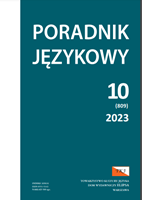POLACY MÓWIĄ O JEDZENIU… KONCEPTUALIZACJA CZYNNOŚCI JEDZENIA W ŚWIETLE POLSKIEJ LEKSYKI
POLES TALK ABOUT EATING... CONCEPTUALISATION OF THE ACT OF EATING IN LIGHT OF POLISH LEXIS
Author(s): Dorota Zdunkiewicz-JedynakContributor(s): Monika Czarnecka (Translator)
Subject(s): Lexis, Sociolinguistics, Cognitive linguistics, Western Slavic Languages
Published by: Dom Wydawniczy ELIPSA
Keywords: cognitive linguistics; food; linguistic worldview; cognitive profile;
Summary/Abstract: This article discusses the Polish vocabulary related to the act of eating. Assuming that lexis acts as a sensitive device to detect and record changes in history and culture, and referring to the methodology of cognitive linguistics, I describe three conceptualisation profiles of the act of eating. The first one described is the biological profile (with 3 cognitive pathways: food is life, food is strength, and food is protection). In the field of “verbs of eating” treated as a biological fact, I distinguish the ones describing the act of eating from the viewpoint of the way it is performed, particularly the speed (fast - slow) and the size of the portions put into the mouth (small or large bites), the amount of food consumed, aesthetics, apparent appetite, and a kind of rhythmicity and automatism of eating or using cutlery, the function of which in eating is compared to an oar - while sailing a boat or a sword - during a fight. Afterwards, I deal with more recent cognitive profiles: psychological and cultural. In particular, I am interested in the contemporary changes, established in language, in the approach to the act of eating towards treating it, for instance, as a threat or disturbance from the sphere of the human psyche (cf. jedzenioholizm (binge eating), feederyzm (feederism), manoreksja (manorexia), ortoreksja (orthorexia), etc.), a way of spending time (cf. gastroturystyka (gastrotourism), foodie, pornografia jedzenia (food pornography), etc.), or as a specific philosophy of life and a component of the human cultural identity (cf. freeganin (a freegan), frutarianin (a fruitarian), fl eksitarianin (a fl exitarian), solarianin (a solarian)).
Journal: Poradnik Językowy
- Issue Year: 2023
- Issue No: 10
- Page Range: 66-83
- Page Count: 18
- Language: Polish

